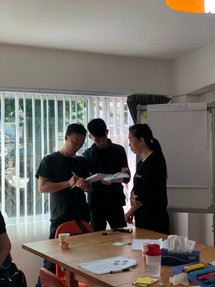Empowering Teams: Highlights from Our Annual Leadership Training Program
- Deane Lam

- Jan 17, 2020
- 2 min read
Updated: May 16, 2024
Leaders will always ask one big question: "What should I bring into my team or organisation to make my team perform better?" I always say: "You don't need to bring in anything or anyone; your team is already the expert, they just need a toolbox" - a toolbox to create a platform and a system to communicate openly and honestly between different teams in an organization.
So what kind of tools do we need in our toolbox? We designed different tools for different groups, yet there is a very important and basic tool for all different groups that we often neglect - basic communication skills - where managers demonstrate effective listening and feedback skills to develop their own team members, as well as demonstrating respect and positive behavior within teams and between managers. If managers are equipped with the basic communication skills - which can be the hardest skill to master - then they are ready to take the next step.
I am grateful to have had this opportunity to collaborate with this management team again this year, to work with young leaders who are in important operational roles supporting their businesses to grow in a fast-growing market. Thus, out of necessity, they focus on operations and daily operations only. What we do is give them a toolbox so that they can see their own role and their team's role in the bigger picture of the organization.
What they achieved in three days was amazing and inspiring. The managers developed their leadership styles to be consistent with their organizational culture; developed their team ground rules; facilitated effective team meetings; mapped out their business system; defined their purpose and team’s guiding principles; mapped out the current process and evaluated an ideal one; and defined an action plan to implement the KPIs. Sounds like a lot, but they did it and they did it really well because they know their job very well, they just needed a toolbox.
One step forward to the Advanced Leadership and Managerial Learning Series. Now they were up to the pace. In the following three days, the managers identified team leadership styles by using the PRISM Leadership Development tool; delegated responsibility with ownership; positively handled conflict situations; prioritized and organized their own tasks; understood our thinking processes for creativity and flexibility; and all these practices led them to exhibit the required skills in problem-solving and decision-making. Sounds like a lot, yet again, they did exceptionally well.
The concept is not to transfer the skills to the managers but to guide them to understand the "WHY" and coach them on "HOW" to apply the tools. Well done team, looking forward to seeing you all practicing the tools at the workplace!


















